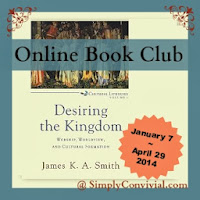
See what others have to say about welcome and song as a part of worship over at Simply Convivial.
God's timing is PERFECT! This past week our women's Bible study started Gospel Love by World Harvest Mission (we have really enjoyed this series as a group). I failed to get the book prior to the first study but as we went through the first lesson it became obvious that this is a study on being the body of Christ. One of the primary questions looked at different scripture passages about our activity as a body and why we are called to do these things in community (sing, give, pray) - not just individually. I overshared this past week because I was so excited to put some of the things I had been thinking about through the study of Desiring the Kingdom with real live people.
The next two sections continue James' exploration of the traditional liturgy and how it communicates to us who God is and who we are a people.
I appreciate what James says about greeting in God's name. If you read through the New Testament they are always sending "grace and peace to you". He says
God's greeting indicates the dialogical nature of Christian worship, a give-and take, back-and-forth interaction: God calls us; by his grace we respond by gathering, invoking his grace and mercy; and God in turn responds to our cry.I am struck by the fact that sometimes people don't realize the dialog but that it is implicit in the structure of worship if you begin with a call from His word. Later James reminds us
In short, God's welcome is a gracious way of reminding us of our utter dependence, cutting against the grain of myths of self sufficiency that we've been immersed in all week long.This humbles me because often I make it to church on my own grit and determination, forgetting it's His invitation and grace that makes a place for me there. As we enter into worship we are invited to lean into Him and not our own understanding.
Next James turns to song. One of the main "aha" moments that came from our Bible study discussion last week was when one of the ladies mentioned that our pastor had mentioned that we sing songs not just to God but to each other as a reminder of his truths and goodness. As we talked about song and music I mentioned the point that Dr. Carol (the musicologist, see "You are What you Listen to") discusses how strange our current world is because music is available everywhere. Until this century, if you wanted music you had to make it! In fact, we now see song making and singing as a professional act and even our worship (with a band and leader, instead of choir or just congregation) points to a performance more than a body singing together in unison. We are losing the communal sense of singing and worship.
James asserts that it is appropriate for "song to be such a primary means for reordering our desires in context of Christian worship." He continues
singing is a mode of expression that seems to reside in our imagination more than other forms of discourse. Partly because of cadence and rhyme, partly because of the rhythms of music, song seems to get implanted in us as a mode of bodily memory.His comments on the Psalms point to just how important they are.
The songs that constitute the Psalms have a crucial role to play in our learning the language of the kingdom. The biblical Psalms are the foundational mentor and guide in this vocabulary and grammar for worship. If being a participating member of a society is reflected by one's ability to speak the language, then one could say that song is one of the primary ways that we learn to speak the language of the kingdom.Last year we did a Bible study on the Psalms and began by talking about the crucial role they played in worship and the lives of Christians in the past. I think we have lost that in our current church culture. The final thought I'll leave you with is this one from James
Figuring out how to be faithful in exile is here tied up with learning how to sing in a strange land.May we be ones who lift our voices and sing and teach our children to do likewise!

No comments:
Post a Comment